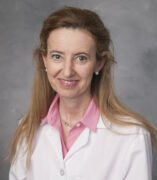
Natalia Nieto, Pharm.D, M.Sc., Ph.D.
Professor
Department of Pathology
Contact
Office Phone:
Email:
Related Sites:
About
During my Ph.D., I acquired solid knowledge on the role of oxidative stress, inflammation and fatty acids in inflammatory bowel disease. In my first period of Postdoctoral training in Dr. Marcos Rojkind Laboratory at the Albert Einstein College of Medicine (New York), an expert in hepatic stellate cells and liver fibrosis, I worked on extracellular matrix biology and on the pathophysiology of liver fibrosis. During my second period of Postdoctoral training in Dr. Arthur I. Cederbaum Laboratory at the Icahn School of Medicine at Mount Sinai (New York), an expert in oxidative stress and liver toxicity, I studied the mechanisms involved in the up-regulation of collagen-I gene expression under oxidative stress conditions and the role of oxidant stress in hepatic fibrosis. Through my training, I developed broad expertise on the crosstalk among liver cells on the fibrogenic response to liver injury, which continues to be the major focus of my research. Thus, I have a long-standing interest in understanding the pathophysiology of liver fibrosis. I have significant experience with various models of liver fibrosis, primary cell isolation, cocultures of hepatocytes, Kupffer cells and hepatic stellate cells and the molecular biology and signaling pathways involved in collagen-I regulation. Upon my arrival to The University of Illinois at Chicago, I started the Extracellular Matrix Biology and Liver Research Program that built a network of scientists within our institution with common research interests.
Clinical and Research Interests:
1. Pathogenesis of hepatic fibrosis
2. Extracellular matrix and regulation of fibrillar collagen deposition and degradation
3. Pathogenesis of alcoholic liver disease
4. Oxidant stress and liver injury
5. Pathogenesis of hepatocellular carcinoma
6. Colon metastasis in the liver
7. Osteopontin and liver disease
8. High-Mobility Group Box-1 and liver injury
9. Mechanisms driving inflammation in the liver
10. Targeting post-translational modification of osteopontin and high-mobility group box-1
11. Systems biology approaches to better understand liver disease
Research Programs:
Liver
Awards and Honors:
2014: 50th Anniversary Fomento Award – Fomento Alumni Medal
2012: European Association for the Study of the Liver – president’s choice poster award
2011: International Society for the Hepatic Sinusoid Research – young investigator travel awards
2009-2013: Research Excellence Incentive Plan, Icahn School of Medicine at Mount Sinai
2008-2010: American Association for the Study of Liver Disease – multiple awards for poster presentations
2008: US Presidential Early Career Award for Scientists – invited candidate
Education
1991: PharmD – University of Granada, Spain
1993: MSc (Biochemistry and Molecular Biology) – University of Granada, Spain
1996: PhD (Biochemistry and Molecular Biology) – University of Granada, Spain
PostGraduate Training:
Internship
1992-1994: Clinical Biochemistry and Microbiology, University Clinic of Navarre (Spain)
Residency
1992-1994: Pharmacist Specialist in Clinical Chemistry, University of Granada (Spain)
Fellowship
1996-1997: Postdoctoral fellow, Albert Einstein College of Medicine (Bronx, NY)
1997-2000: Postdoctoral fellow, Icahn School of Medicine at Mount Sinai (New York, NY)